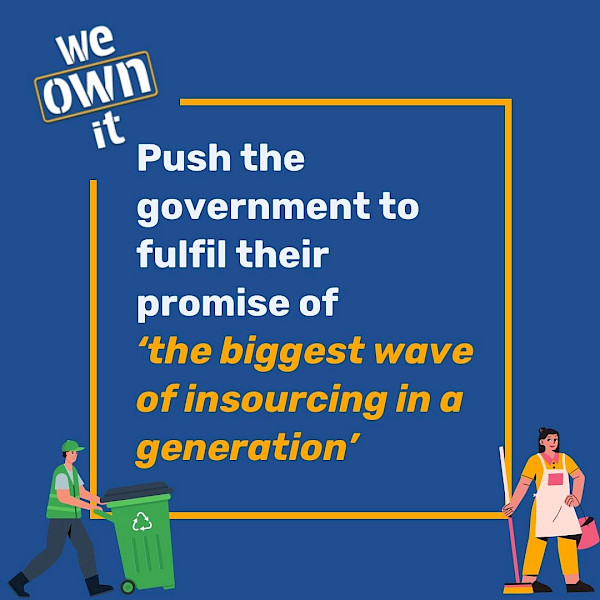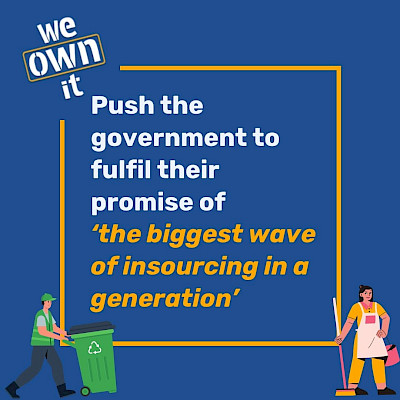
29 Aug 2025
In their 2024 ‘Plan to Make Work Pay’, Labour promised to deliver ‘the biggest wave of insourcing of public services in a generation’.
But we haven’t seen it yet.
Insourcing is the process of bringing the delivery of a public service in-house, so that local authorities deliver it themselves. It is the opposite of outsourcing, where a private company is contracted to deliver the service in exchange for making a profit. Services which are commonly outsourced include social care, waste collection and cleaning public buildings (such as schools and hospitals).
Bringing these essential services back into public control creates a whole host of benefits:
-
It is better value for money - insourcing means that taxpayers’ money is not wasted on profits.
-
It gives local authorities greater control - Insourcing gives authorities meaningful financial control, which enables them to serve their communities and meet social and environmental targets.
-
It provides better public services - by increasing control, reducing fragmentation and better supporting the workforce, insourcing delivers better services for the public.
-
It’s a better deal for workers - who get better pay and conditions under insourced contracts. Under outsourced contracts, these rights are sacrificed for profit.
-
It keeps spending in the local economy - under insourcing, local authorities can deliver services by using local supply chains, meaning many members of the community benefit.
-
It increases accountability - insourcing enables people to have a say in how the services they depend on are run.
Insourcing is so beneficial, that in 2019 77% of UK Councils were planning to bring services back in-house. The Labour Party at the time pledged that all frontline services would be provided by the public sector. This was followed in 2024 by Starmer’s ‘wave of insourcing’ promise.
Although they’re still far from meeting this promise, this government has put it (tentatively) back on the table by considering changes to the Procurement Act 2023, which sets rules for how the public sector spends money.
Among several other proposals, the government has suggested introducing a public interest test, which would be undertaken before making a decision on whether to insource or outsource a service.
This is good news. Insourcing is fundamentally in the public interest, so these tests should - in theory - prompt more contracts being brought back in-house.
However, the specific terms of these tests will determine just how much insourcing actually gets done. That’s why we’re making 4 key demands about new public interest tests.
1 - The government must actively create in-house capacity
-
The current proposal suggests that a public interest test is likely to include questions around ‘appropriate in-house capability’ as a means of informing sourcing decisions
-
A decade of austerity has decimated local authority budgets: some councils' core budgets have shrunk by half since 2010. Councils simply don’t currently have the resources they need to insource.
-
In order to make a success of the Procurement Act 2023 and truly deliver improved social value, the government needs to increase local authority resources.
2 - The government must lower the £5 million threshold for public interest tests
-
The current proposal suggests that only contracts worth £5 million + should be subject to a public interest test before a sourcing decision is made.
-
This threshold should be lowered so that smaller contracts also require public interest tests.
-
Doing so would enable local authorities to build their capacity for insourcing.
3- Social and environmental value should also be considered in public interest tests
-
The current questions proposed for a public interest test are limited to matters of feasibility and cost. This contradicts the National Procurement Policy Statement, which outlines the importance of social value, as well as economic value.
-
Insourcing delivers social value because it recycles spending into the local economy and provides opportunities for local people to have more of a say in how their services are run. It also provides workers with better terms and conditions.
-
Insourcing provides local authorities with greater control over the design and delivery of services. This means that insourced services can be more aligned with local authority climate policies. As the Association for Public Service Excellence has reported, ‘in-house teams are far more likely to adhere to Green Accords and local environmental strategies’.
4- Adult and child social care should be run as not-for-profit services
-
Local councils are spending two-thirds of their budgets on social care services.
-
In 2022, 19% of the aggregate income of the 20 largest independent children’s social care providers was taken as profit. This amounted to £310 million, money which could - and should - have been in public hands.
-
Wales passed a law in February to end private profit in children’s social care. Scotland is currently creating legislation to limit profit in children’s residential care. England must follow suit.
-
Ending the profit motive in adult social care would mean improve quality and reduce inequities.
No more broken promises. By delivering on these demands, the government would show that they are truly committed to delivering their much-awaited wave of insourcing.

